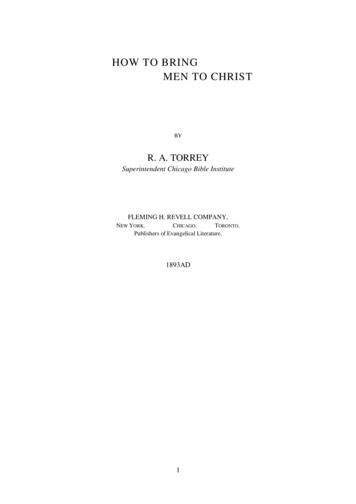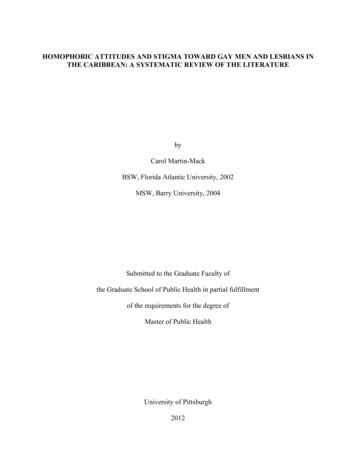
Transcription
HOW TO BRINGMEN TO CHRISTBYR. A. TORREYSuperintendent Chicago Bible InstituteFLEMING H. REVELL COMPANY,NEW YORK.CHICAGO.TORONTO.Publishers of Evangelical Literature.1893AD1
PREFACEThis book is written because it seems to be needed. The author has been repeatedly requested by Ministers, Y. M. C. A. Secretaries, Christian Workers, andhis own students to put into a permanent and convenient shape the substance ofwhat he has said at Conventions, Summer Schools and in the classroom on personal work. The time has come to yield to these requests. Never before in the history of the Church were there so many who desire to win others to Christ. Thegood work done by the Young People’s Society of Christian Endeavor is in noother direction so evident as in the many thousands of young people in this land,who today are on fire with a desire to win souls. But while they desire to do thiswork, many do not know how. This little book aims to tell them. There are severalwell-known and valuable manuals of texts to be used with inquirers, but this bookis intended not only to point out passages to be used but to show how to use them,illustrating this use by cases from actual experience. It is hoped that from a carefulstudy of these pages any earnest Christian can learn how to do efficient work inbringing others to the Saviour.2
HOW TO BRING MEN TO CHRISTCHAPTER ITHE GENERAL CONDITIONS OF SUCCESS INBRINGING MEN TO CHRISTThere are certain general conditions, the fulfilment of which is absolutely essential to real success in bringing men to Christ. These conditions, fortunately, are few and simple and such as any one can meet.1. The one who would have real success in bringing others to Christmust himself be A THOROUGHLY CONVERTED PERSON. Jesus said to Peter,“When thou art converted strengthen thy brethren.” He was in no positionto help his brethren until he himself, after his cowardly denial, had turnedagain to his Lord with his whole heart. If we would bring others to Christwe must turn away from all sin, and worldliness and selfishness with ourwhole heart, yielding to Jesus the absolute lordship over our thoughts, purposes and actions. If there is any direction in which we are seeking to haveour own way and not letting Him have His own way in our lives, our powerwill be crippled and men lost that we might have saved. The application ofthis principle to the numerous questions that come up in the life of everyyoung Christian as to whether he should do this or that, each individual cansettle for himself if Christ’s honor and not his own pleasure is uppermost inhis mind and if he looks honestly to God to guide him.2. The one who would have real success in bringing others to Christmust have a LOVE FOR SOULS, i.e. a longing for the salvation of the lost. Ifwe have no love for souls, our efforts will be mechanical and powerless.We may know how to approach men and what to say to them, but there willbe no power in what we say and it will not touch the heart. But if like Paulwe have “great heaviness and unceasing pain in our hearts” for the unsaved,there will be an earnestness in our tone and manner that will impress themost careless. Furthermore if we have a love for souls we will be on theconstant watch for opportunities to speak with the unsaved and will findopportunities on the street, in the store, in the home, on the cars and everywhere that would otherwise have entirely escaped our notice.But how is one to get a love for souls? This question is easily answered.First of all, a love for souls like every other grace of Christian character, isthe work of the Holy Spirit. If then we are conscious that we do not havethat love for souls that we should have, the first thing to do is to go to Godand humbly confess this lack in our lives and ask Him by His Holy Spirit to3
supply that which we so sorely need and expect Him to do it (1 John v. 14,15; Phil. iv. 19). In the second place Jesus Christ had an intense love forsouls (Matt. xxiii. 37; Luke xix. 10), and intimate and constant companionship with Him will impart to our lives this grace which was so prominent inHis. In the third place feelings are the outcome of thoughts. If we desireany given feeling in our lives we should dwell upon the thoughts which areadapted to produce that feeling. If any saved person will dwell long enoughupon the peril and wretchedness of any man out of Christ and the worth ofhis soul in God’s sight as seen in the death of God’s Son to save him, afeeling of intense desire for that man’s salvation is almost certain to follow.In the fourth place, reflection upon our own ruined and unhappy conditionwithout Christ and the great sacrifice that Christ made to save us, is sure tofill our hearts with a desire to bring others to the Saviour we have found.3. The one who would have real success in bringing men to Christ, musthave a WORKING KNOWLEDGE OF THE BIBLE. The Word of God is thesword of the Spirit (Eph vi. 17). It is the instrument God uses to convict ofsin, to reveal Christ and to regenerate men. If we would work together withGod, the Bible is the instrument upon which we must rely and which wemust use in bringing men to Christ. We must know how to use the Bible soas (1) to show men their need of a Saviour, (2) to show them Jesus as theSaviour they need, (3) to show them how to make this Saviour their ownSaviour, (4) to meet the difficulties that stand in the way of their acceptingChrist. A large part of the following pages will be devoted to imparting thisknowledge.4. The one who would have real success in bringing men to Christ mustPRAY MUCH. Solid work in soul winning must be accompanied by prayer atevery step. (1). We must pray God to lead us to the right persons to approach. God does not intend that we speak to every one we meet. If we tryto do it, we will waste much valuable time in speaking to those whom wecannot help, that we might have used in speaking to those to whom wecould have done much good. God alone knows the one to whom He intendsus to speak, and we must ask Him to point him out to us, and, expect Himto do it. (Acts viii. 29). (2). We must pray God to show us just what to sayto those to whom He leads us. After all our study of the passages to be usedin dealing with the various classes of men, we shall need God’s guidance ineach specific case. Every experienced worker will testify to the many instances in which God has led them to use some text of Scripture that theywould not otherwise have used but which proved to be just the one needed.(3). We must pray God to give power to that which He has given us to say.We need not only a message from God but power from God to send themessage home. Most workers have to learn this lesson by humiliating expe-4
riences. They sit down beside an unsaved man and reason and plead andbring forth texts from the word of God, but the man does not accept Christ.At last it dawns upon them that they are trying to convert the man in theirown strength and then they lift a humble and earnest prayer to God for hisstrength, and God hears and in a short time this “very difficult case” hassettled the matter and is rejoicing in Christ. (4). We must pray God to carryon the work after our work has come to an end. After having done thatwhich seems to have been our whole duty in any given instance, whatevermay have been the apparent issue of our work, whether successful or unsuccessful, we should definitely commit the case to God in prayer. If thereis anything the average worker in this hurrying age needs to have impressedupon him, it is the necessity of more prayer. By praying more we will notwork any less and we will accomplish vastly more.5. The one who would have real success in bringing men to Christ mustbe “BAPTIZED WITH THE HOLY GHOST.” “Ye shall receive power after thatthe Holy Ghost, is come upon you,” said Jesus to his disciples after havinggiven them the great commission to go out and bring men to Himself. Thesupreme condition of soul winning power is the same today: “after that theHoly Ghost is come upon you.” A later chapter will be given to a study ofwhat “the Baptism of the Holy Ghost” is and how any Christian can obtainit.5
CHAPTER IIHOW TO BEGINWhen God has led us to think that He wishes us to make an effort to leadsome given individual to Christ, the first question that confronts us is,“How shall I begin?” If the person has gone into an inquiry room, or remained to an after-meeting, or even if they are merely present at prayermeeting, Sunday-school or other ordinary service of the church, it is comparatively easy. You can then ask him if he is a Christian, or if he wouldnot like to be a Christian, or why he is not a Christian or some other directand simple question that will lead inevitably to a conversation along thisline. But if the person is one in whom you have become interested outsidethe religious meeting and who is perhaps an entire stranger, it does not atfirst sight appear so simple, and yet it is not so very difficult. The personcan be engaged in conversation on some general topic or on somethingsuggested by passing events, and soon brought around to the great subject.Christ’s conversation with the woman of Samaria in the 4th chapter of Johnis a very instructive illustration of this. Oftentimes, even in dealing withentire strangers, it is well to broach the subject at once and ask them if theyare Christians or if they are saved or some similar question. If this is donecourteously and earnestly it will frequently set even careless people tothinking and result in their conversion. It is astonishing how often one whoundertakes this work in humble dependence upon God and under His direction, finds the way prepared, and how seldom he receives any rebuff. Oneday the writer met a man on one of the most crowded streets of Chicago.As I passed him the impulse came to speak to him about the Saviour. Stopping a moment and asking God to show me if the impulse was from Him, Iturned around and followed the man. I overtook him in the middle of thestreet, laid my hand upon his shoulder and said: “My friend, are you aChristian?” He started and said: “That’s a strange question to ask a man.” Isaid, “I know it, and I do not ask that question of every stranger, but Godput it into my heart to ask it of you.” He then told me that his cousin was aminister and had been urging this very matter upon him, that he himselfwas a graduate of Amherst college, but had been ruined by drink. After further conversation we separated but later the man accepted Christ as his Saviour.It is often best to win a person’s confidence and affection before broaching the subject. It is well to select some one and then lay your plans to winhim to Christ. Cultivate his acquaintance, show him many attentions andperform many acts of kindness great and small and at last when the fitting6
moment arrives take up the great question. An old and thorough going infidel in Chicago was in this way won to Christ by a young woman, whofound him sick and alone. She called day after day and showed him manykindnesses and as the consumption fastened itself more firmly upon himshe spoke to him of the Saviour and had the joy of seeing him acceptChrist.A wisely chosen tract placed in the hand of the one with whom you wishto speak will often lead easily and naturally to the subject. One day I wasriding on a train and praying that God would use me to lead someone to HisSon. A young lady, daughter of a minister, with whom I had had some conversation on this subject came in with a friend and took the seat immediately in front of me. I took out a little bundle of tracts and selected one thatseemed adapted for the purpose and handed it to her and asked her to readit. As she read, I prayed. When she had finished, I leaned over and askedher what she thought about it. She was deeply moved and I asked her if shewould not accept Christ right there. Her difficulties were soon met and answered and she accepted Christ. As she left the train she thanked me veryheartily for what I had done for her.You will often meet someone whose face tells the story of unhappinessor discontent: in such a case it is easy to ask the person if he is happy andwhen he answers “no” you can say, “I can tell you of one who will makeyou happy if you will only take Him.” Skill in beginning a conversationwill come with practice. One may be rather awkward about it at first but aswe go on we will acquire facility.When the subject is once opened the first thing to find out is where theperson with whom you are dealing stands; then you will know how to wisely treat his case. In the chapters immediately following this all the classesof men one is likely to meet will be given, and the first point to be ascertained is to which class any given individual belongs. But how can we findout to which class any person belongs? First. By asking him questions.Such questions as “Are you a Christian?” “Are you saved?” “Do you knowthat your sins are forgiven?” “Have you eternal life?” “Are you confessingChrist openly before the world?” “Are you a friend of Jesus?” “Have youbeen born again?” One may answer these questions untruthfully, eitherthrough ignorance or a desire to mislead you. Nevertheless, their answersand the manner of them will show you a great deal about their real state.Second. By watching his face. A man’s face will often reveal that which hiswords try to conceal. Anyone who cultivates the study of the faces of thosewith whom he deals will soon be able to tell in many instances the exactstate of those with whom they are dealing irrespective of anything they maysay. Third. By the Holy Spirit. The Holy Spirit if we only look to Him to do7
it will often flash into our minds a view of the man’s position, and just thescripture he needs.When we have learned where the person with whom we are dealingstands, the next thing to do is to lead him as directly as we can to acceptJesus Christ, as his personal Savior and Master. We must always bear inmind that the primary purpose of our work, is not to get persons to join thechurch or to give up their bad habits or to do anything else than this, to accept Jesus Christ, as their Saviour—the one who bore their sins in his ownbody on the tree and through whom they can have immediate and entireforgiveness,— and as their Master to whom they surrender absolutely theguidance of their thoughts, feelings, purposes and actions. Having led anyone to thus accept Christ, the next step will be to show him from God’sword that he has forgiveness of sins and eternal life. Acts x. 43, xiii. 39;John iii. 36; v. 24, will answer for this purpose. The next step will be toshow him how to make a success of the Christian life upon which he hasentered. How to do this will be told later. Each person is to be led to acceptChrist through a use of the word of God. In the chapters that immediatelyfollow this we will try to show what specific portions of the word to use ingiven cases and how to use them.8
CHAPTER IIIDEALING WITH THE INDIFFERENT OR CARELESSOne of the classes of men most frequently met with, is The Indifferent,or Careless. There are several ways of dealing with them. One is to showthem their need of a Saviour. A good verse to use for this purpose is Romans iii. 23. Get the person with whom you are dealing to read the verse,“For all have sinned and come short of the glory of God.” Then say to him:“Who have sinned?” “All”. “Who does that include?” and keep up thequestioning until he says, “It includes me.” Then ask him what it is that hehas done, and keep at it until he comes out plainly and says: “I have sinnedand come short of the glory of God.” This is likely to make him feel hisneed of a Saviour. Another good verse to use is Isaiah liii. 6. After the versehas been read, ask him who it is that has gone astray and by a series ofquestions bring him to the point where he will say, “I have gone astray.”Then ask him what kind of a sheep one is that has gone astray” and holdhim to it until he says “a lost sheep.” “What are you then?” “Lost.” Thenask him what the Lord has done with his sin, and hold him to that point until he sees the truth of the verse, that God has laid his sin on Jesus Christ.Now, he is in a position for you to put to him the direct question: “Will youaccept this Saviour upon whom the Lord has laid your sin?” Still anotherverse to use is Psalms cxxx. 3. When the verse has been read, ask him, “Ifthe Lord marked iniquities could you stand?” In dealing with this class ofmen I use Matthew xxii. 37, 38 more frequently than any other passage ofScripture. Before having the person read the verse, it is well to ask him,“Do you know that you have committed the greatest sin that a man cancommit?” In all probability he will answer, “No, I have not.” Then ask himwhat he thinks the greatest sin a man can commit. When he has answered,say to him, Now let us see what God considers the greatest sin. Read theverses and ask him, “What is the first and greatest of the commandments?”Then ask him, “What then is the greatest sin?” He will soon answer that theviolation of the first and greatest of the commandments must be the greatestsin. Ask him if he has kept that commandment and when he confesses, assooner or later he must, that he has not, ask him of what he is guilty in thesight of God, and hold him to that point until he admits that he is guilty ofcommitting the greatest sin that a man can commit.An illustration from life may help to make the use of this verse clear. Iwas dealing with a very bright young man who evidently had no deep senseof sin nor of his need of a Saviour. In fact when I asked if he was a Christian he said promptly that he always had been; but there was something in9
his manner that showed that he had no clear understanding of what it meantto be a Christian. I then asked if he had been born again and he did not evenunderstand what I was talking about. I next asked if he knew he had committed the greatest sin that a man could possibly commit and he at once answered, “No, I never did in my life.” I asked what he considered the greatest sin, and he replied “murder.” I took my Bible and opened it to Matthewxxii. 37, 38, and asked him to read the verses, which he did. I then askedhim, “If this is the first and greatest commandment, what must be the greatest sin.” He answered, “I suppose the breaking of that commandment” Ithen asked if he had always kept that commandment, if he had alwaysloved God with all his heart, with all his soul, and with all his mind. If hehad always put God first in everything. He replied that he had not. I thenasked him, “Of what then are you guilty?” The Spirit of God carried thetext home and with the greatest earnestness he replied, “I have committedthe greatest sin that a man can commit, but I never saw it before in mylife.” Another verse that can be used with effect is John viii. 34. After theman has read the verse, “Whosoever committeth sin is the servant of sin,”ask him “what is one who commits sin?” Then ask him if he commits sin.Then put to him the direct question, “What are you then,” and hold him to ituntil he says “the servant of sin.” Then ask him if he does not desire to bedelivered from that awful bondage. Hold him to this point until he sees hisneed of Jesus Christ as a Deliverer from the slavery of sin. The Holy Spirithas used Isaiah lvii. 21 to the salvation of many men who have been indifferent to the claims of the Gospel. After the verse, “There is no peace saithmy God to the wicked,” has been read slowly, thoughtfully, and earnestly,ask him who it is that says this. Then ask him if it is true; then ask him if itis true in his case. “Have you peace?” One night a careless young man wasgoing out of one of our tents in Chicago and as he passed by me I took himby the hand and said to him, “You need the Saviour.” He wanted to knowwhy I thought so. I replied, “Because you have no peace.” He said, “Yes Ihave.” “No you have not.” He then asked me how I knew that. I told himGod said so and quoted the above passage. He tried to laugh it off and saythe verse was not true in his case. Then he became angry and went out ofthe tent in a rage, but the next night I saw him kneeling with one of ourworkers in prayer and when he arose from his knees, the worker came overand said he wished to speak with me. As I approached him he held out hishand and said, “I wanted to beg your pardon for what I said last night; whatyou said was true, I didn’t have peace.” I asked him if he had now acceptedthe Saviour. He said he had.Galatians iii. 10 is a verse which we very frequently use in our work indealing with the Indifferent. After the one with whom you are dealing has10
read the verse, “For as many as are of the works of the law are under thecurse; for it is written cursed is every one that continueth not in all thingswhich are written in the book of the law to do them,” ask him the question,“What is every one that continueth not in all things which are written in thebook of the law to do them?” When he answers, “Cursed,” ask him if hehas continued in all things which are written in the book of the law to dothem and when he replies, “No, I have not,” put to him the direct question,“What are you then?” and hold him to that point until he says, “I am underthe curse.” In very many cases the inquirer will be ready at once to be led tothe thirteenth verse of the same chapter which shows how he may be savedfrom that curse under which he rests. Romans vi. 23 can often be used withgood effect. “For the wages of sin is death.” Ask “what are the wages ofsin?” Then, “who earns those wages?” Then, “Are you a sinner?” “Whatwages then have you earned?” “Do you wish to take your wages.” John iii.36 is a verse which can be used in a similar way. Ask the question, “Uponwhom is it that the wrath of God abides?” Then, “Do you believe on theSon?” “What then abides upon you?” Then put the decisive question, “Areyou willing to go away with the wrath of God abiding upon you?” 2 Thes. i.7-9, and John viii. 24, Rev. xx. 15; xxi. 8; xiv. 10-11, set forth in a mostimpressive way the awful consequences of sin. If these verses are used theyshould be read with the deepest earnestness and solemnity and dwelt uponuntil the person with whom you are dealing realizes their terrible import.There is another way to arouse a man from his indifference, and that isby showing what Jesus has done for him. I have found Isaiah liii. 5-6 moreeffectual for this purpose than any other passage in the Bible. An incidentfrom life will illustrate its use. A lady had asked prayers for her daughter, ayoung woman about twenty years of age. At the close of the services Istepped up to the daughter and asked her if she would not accept JesusChrist as her Saviour at once. She stamped her foot in anger and said, “Mymother should have known better than to do that; she knows it will onlymake me worse.” I asked her if she would not sit down for a few minutes,and as soon as we were seated I opened my Bible to this passage and beganto read, “But he was wounded for our transgressions, he was bruised for ouriniquities; the chastisement of our peace was upon him; and with his stripeswe are healed. All we like sheep have gone astray; we have turned everyone to his own way; and the Lord hath laid on him the iniquity of us all.” Imade no comment upon the verses whatever, but the Spirit of God carriedthem home and tears began to roll down the cheeks of the young woman.She did not come out as a Christian that night but did shortly afterward. Itis well in using these verses, whenever it is possible, to get the inquirer tochange the pronoun from the plural to the singular. “He was wounded for11
my transgressions; he was bruised for my iniquities, etc.” John iii. 16 can beused in a similar way. I was talking one night to one who was apparentlymost indifferent and hardened. She told me the story of her sin, with seemingly very little sense of shame, and when I urged her to accept Christ, shesimply refused. I put a Bible in her hands and asked her to read this verse.She began to read, “God so loved the world that He gave His only begottenSon,” and before she had finished reading the verse she had broken intotears, softened by the thought of God’s wondrous love to her. First Peter ii.24 is a verse of similar character. Ask the inquirer whose sins they werethat Jesus bore in his own body on the tree, and hold him to it until he says,“My sins.” 1 Peter i. 18-19, Luke xxii. 44, Matt, xxvii. 46, are useful asbringing out in detail what Christ has suffered for us.There is still another way to arouse indifferent persons, and that is byshowing them that the one damning sin is that of which they themselves areguilty—the sin of rejecting Jesus Christ. Heb x. 28-29 is very effective forthis purpose. John xvi. 9; iii. 18, 19, 20, and Acts ii. 36 can also be used.Oftentimes you will meet one who is not willing to sit down and let youdeal with him in this deliberate way. In that case the only thing to do is tolook up to God for guidance and power and give him some pointed verse ingreat earnestness, such for example as Heb. x. 28-29, Romans vi. 23, Johniii. 36, Isaiah lvii. 21, and leave it for the Spirit of God to carry the truthhome to his heart. A passing shot of this kind has often resulted in the salvation of a soul. The passages given above can be wisely used with onewho is not altogether indifferent or careless but who has not a sufficientlydeep sense of sin and need to be ready to accept the Gospel.12
CHAPTER IVDEALING WITH THOSE WHO ARE ANXIOUS TO BESAVED BUT DO NOT KNOW HOW.There is a very large class of persons who are anxious to be saved butsimply do not know how. It is not difficult to lead this class of persons toChrist. Perhaps no other passage in the Bible is more used for this purposethan Isaiah liii. 6. It makes the way of salvation very plain. Read the firstpart of the verse to the inquirer, “All we like sheep have gone astray, wehave turned every one to his own way.” Then ask, “Is that true of you,” andwhen he has thought it over and said “yes,” then say to him, “Now let ussee what God has done with your sins,” and read the remainder of theverse, “And the Lord hath laid on him the iniquity of us all.” “What then isit necessary for you to do to be saved?” Very soon he can be led to see thatall that it is necessary for him to do is to accept the sin bearer whom Godhas provided. Some years ago I noticed in a meeting a white-haired manwho did not stand up with the Christians. At the close of the service Iwalked down to him and said, “Are you not a Christian?” He said he wasnot. I was sure he was interested, so I put to him the direct question,“Would you become a Christian tonight if I would show you the way?” andhe replied that he would. We sat down together and I opened my Bible toIsaiah liii. 6 and read the first part of the verse, “All we like sheep havegone astray, we have turned every one to his own way.” I then said to him,“Is that true of you?” and he answered “yes.” “Now,” I said, “let us read therest of the verse, ‘and the Lord hath laid on him the iniquity of us all.’”“What has the Lord done,” I said, “with your sins?” He thought a momentand said “he has laid them on Christ.” “What then” I said “is all that youhave to do to be saved?” and he replied quite promptly, “Accept him.”“Well,” I said, “will you accept him tonight?” He said, “I will.” “Let usthen kneel down and tell God so.” We knelt down and I led in prayer andhe followed in a very simple way telling God that he was a sinner but thathe believed that He had laid his sins upon Jesus Christ, and asking God forChrist’s sake to forgive his sins. When he had finished I asked him if hethought God had heard his prayer and that his sins were forgiven, and hesaid “yes.” I then asked him if he would begin to lead a Christian life atonce, set up the family altar and openly confess Christ before the world,and he replied that he would. Some months after I met his pastor and madeinquiries about him and found that he had gone to his home in a distant village, set up the family altar and united with the church together with hisson, the only remaining member of the family out of Christ. Apparently all13
that this man was waiting for was for someone to make the way of salvation plain to him.I sometimes put it this way in using this verse: “There are two thingswhich a man needs to know and one thing he needs to do in order to besaved. What he needs to know is, first, that he is a lost sinner and this versetells him that; second, that Christ is an all-sufficient Saviour and this versetells him that. What he needs to do is simply to accept this all-sufficientSaviour whom God has provided.” John i. 12 brings out this thought veryclearly, “As many as received him to them gave he power to become thesons of God, even to them that believe on his name.” After the verse hasbeen read you can ask the one with whom you are dealing, “To whom is itthat God gives the power to become the sons of God.” “As many as receivehim.” What must you then do to become a son of God? “Receive him.”Well, will you receive him as your Saviour and as your master now? Isaiahlv. 7, Acts xvi. 31, John iii. 16 and iii. 36 are all useful in making the wayof salvation plain. John iii. 14 compared with Numbers xxi. 8 and the following verses, can often be used with good effect. When they are used youshould lead the inquirer to see just what the serpent-bitten Israelite had todo to be saved—that he had simply to look at the brazen serpent lifted upupon the pole—then show him that the sin-bitten man has to do simply thesame thing—look at Christ lifted up on the Cross for his sins.Romans i. 16 is another excellent verse to use. It makes the way of salvation very clear. You can ask the inquirer whom it is, according to thisverse, that the Gospel saves, and he will see that it is “every one that believet
the work of the Holy Spirit. If then we are conscious that we do not have . and humbly confess this lack in our lives and ask Him by His Holy Spirit to. 4 supply that which we so sorely need and expect Him to do it (1 John v. 14, 15; Phil. iv. 19). In the second place Jesus Christ had an intense love fo











